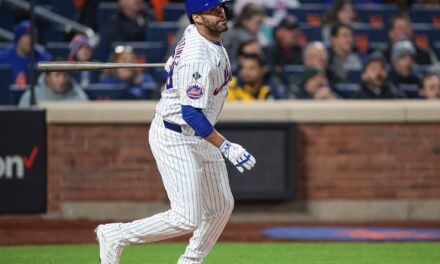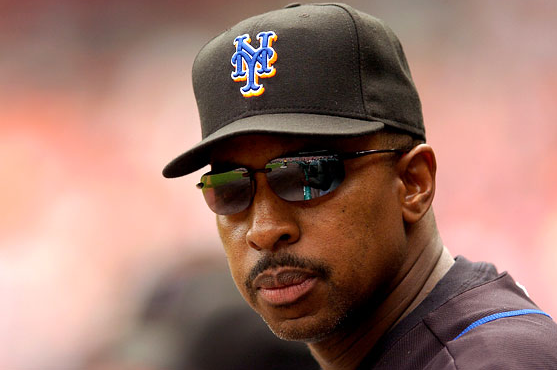
The death of George Floyd last week, along with the killing of Michael Brown in 2014, the grand jury decision in the case of Eric Garner in 2015, and the neo-Nazi and white supremacists march in Charlottesville, Virginia in 2017, have aggravated what many historians call ‘the fault line of America’—racism.
These examples do not constitute an inclusive listing of the injustices done through the blind eye that is racism in our country. It is, instead, a reminder that something must be done about it.
Floyd’s brutal slaying is just another tragic reminder of the racial disparity that remains in our country.
Together, we mourn the loss of a life taken unjustly. Racial injustice is wrong and inconsistent with the values of America .
We are all different, and that’s a beautiful thing. Our diversity is our strength and should not be used to divide us.
At MMO, we encourage, honor, and celebrate differences in our writers and staff, including race or ethnicity. Inclusion and diversity of ideas, thoughts, and experiences are vital to our culture and the way we do business.
Diversity makes us more successful in providing the best service possible to our very diverse readers across the country.
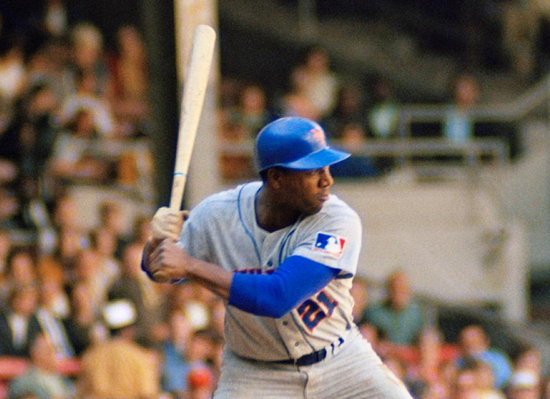
To that end, and in the spirit of our recently published article on Cleon Jones, we proudly present a piece on Willie Randolph — the first African-American manager of a professional baseball franchise in New York and the 18th manager of the New York Mets.
For those of you who have a good memory, you’ll note it is a largely a reprint of an article published in November of 2018, that has been freshened up a bit to be more in line with today’s culture.
Please be clear that we do not intend to make it a habit to re-use old articles, our pride and joy is original content. In this case, however, an exception was made, not to placate minorities, but rather to celebrate them.
On top of Willie Randolph’s hiring as a Met, we must remember the man who hired him—Omar Minaya, is also a minority.
Although nice, this hiring does not and is not meant to exonerate the short comings that exist in all major sports with regard to minority hiring, especially in the front office.
But, at least for one fall afternoon, the New York Mets laid aside skin color in deference to finding the best person for the job, and for that, commendation is worthwhile and in this rare case, reaffirmation is warranted.
* * * * * * *
On November 4, 2004, an important barrier was broken in New York coaching ranks.
Willie Randolph was named the 18th manager of the New York Mets, making him the first African-American manager of a MLB team in New York.
Randolph had no prior experience managing a professional team on any level prior, but was a popular and well-respected figure in the New York baseball landscape. He went on to manage the Mets from to 2005-08 before being fired rather ignominiously.
But, he left a mostly positive mark on Mets managerial history, as he helped turn around a team that hadn’t enjoyed success in years and led them to the cusp of a World Series appearance.
Willie Larry Randolph grew up in Brooklyn as a Mets fan enchanted by the amazing run they had in 1969. His favorite player on that team was Ken Boswell, and he would later honor Boswell by wearing his No. 12 when he became a Met.
Randolph started his playing career in the Pittsburgh Pirates organization and was called up to the majors in July, 1975. He played only 30 games that year for the Pirates before he was traded in the offseason to the Yankees.
Randolph spent the next 13 years playing second base for the Bombers, winning two World Series rings and earning five All-Star appearances.
He batted second in the line-up due his patient hitting style (he drew over 80 walks in seven different seasons) and excellent bunting skills.
Randolph was also an accomplished second baseman, leading the league once in both put-outs and assists. He never won a Gold Glove in his career but was a considered by his peers as a top-notch defensive player. He was co-captain of the Yanks, along with Ron Guidry, from 1986-88.
After his time with the Yankees, Randolph played for the Dodgers, Athletics and Brewers before finishing his playing career as a New York Met.
He was 37 when he joined the Mets, making him the eighth oldest player in the league. He retired with a .276 life-time batting average with 2,210 hits, 1,243 walks and a .373 on-base percentage.
In the field, he finished with 4,859 put-outs (ninth all-time), turned 1,547 double-plays (third all-time) and had a .980 fielding percentage.
When his playing days were over, Randolph spent 11 seasons as a base and bench coach for the Yankees.
During his coaching tenure with the Yanks, Randolph interviewed for several managerial positions, only to be denied each time.
Meanwhile crosstown, the Mets were not performing well on the field. From 2002-04, they had a losing record, and in 2001 — were barely over .500 at 82-80.
In an attempt to reach the lofty standards practiced in the Bronx, the Mets reached out to a popular star in Randolph who had interviewed for the position before, only to be deemed too inexperienced, with the Mets hiring Art Howe instead.
The difference this time was that the Mets had a new general manager in Omar Minaya. He started his job by replacing Jim Duquette — who was reassigned in September, 2004.
Minaya wanted a manager with great communication skills, (both with players and the front office), someone willing to do community service, and available to work 12 months a year — including traveling to minor league and instructional league teams in the offseason.
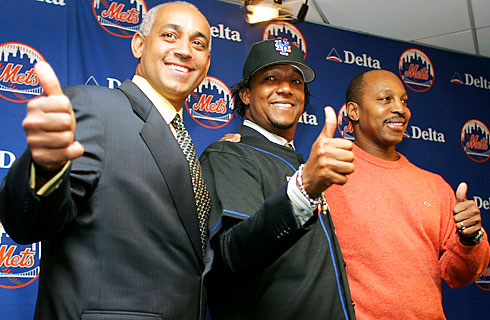
After two rounds of interviews, Randolph was hired by the Mets on November 4, 2004. He was the Mets’ third manager in a four year span.
He also became the eighth person to both play for and eventually manage the Mets. Randolph credits his former boss and coaches for his promotion to manager as he told the New York Times.
“I learned a lot working with Joe Torre. You take a little bit from everyone and form your own identity,” he said. “I’m a winner.”
He made his managerial debut on Opening Day in 2005, losing that game and the next four thereafter. He got his first win as manager on April 10, defeating the Atlanta Braves.
The Mets went on to post a 83-79 record in 2005, which was a 15 win improvement over 2004 and their first winning season since 2001.
In 2006, Randolph led the Mets to their first division title since 1988, winning 97 games which tied for the best record in the league.
The Mets swept the Los Angeles Dodgers in the NLDS but were beaten by the eventual World Series champion St. Louis Cardinals, losing a heartbreaking Game 7 in the NLCS.
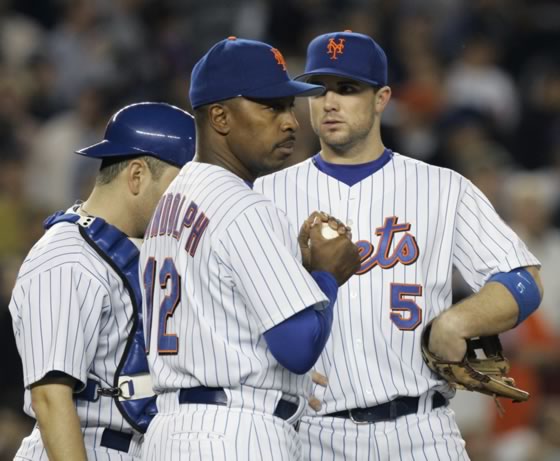
The Mets win total improved another 14 games in 2006, making Randolph the first manager in major league history to have his team improve by 12 or more wins in each of his first two seasons.
On January 24, 2007 , Randolph signed a three year, $5.65 million extension with the Mets with a club option for 2010.
Unfortunately, 2007 marked the beginning of the end for Willie Randolph and the Mets. The team won 88 games and was in first place for the majority of the year. It was assumed by many fans that the Mets would take the next step from their loss in the 2006 NLCS and contend for a World Series championship.
But with a seven game lead with 17 games to play in the regular season, everything went south as the Mets finished the season 5-12, losing out to the Philadelphia Phillies (who went 13-4 during that span), for the NL East crown.
It is considered by many to be the one of the biggest collapses in baseball history. Rumblings about firing Willie Randolph began in earnest.
Those rumblings grew more intense as the Mets got off to a slow start in 2008, playing poorly with a record hovering around .500 in June. Chants of “fire Willie!” rained down louder and louder in Shea Stadium and he was roasted on NY sports talk radio.
On a West Coast trip, Omar Minaya did what most fans screamed for and fired Willie Randolph, along with pitching coach Rick Peterson and first base coach Tom Nieto.
Randolph was replaced by bench coach, Jerry Manuel. The Mets finished with 89 wins in 2008 and once again missed the playoffs. As it turned out, 2008 was the last Mets winning season until 2015.
In Randolph’s three year, two month spell as manager of the Mets, he compiled a record of 302-253. His winning percentage of .544 ranks him second all-time to Davey Johnson. He finished his coaching career with brief stints at Milwaukee and Baltimore.
Randolph never became a manager for another major league club, although he insisted he was still a viable candidate for a coaching position.
Many in the media as well as many Met players felt the firing of Willie Randolph was handled poorly, leaving a stain on the organization.
Much has been written on his demise with the Mets, but this story is not about unhappy endings, but rather one of a hopeful beginning.
The Mets were floundering on the field in the early ’00s until Randolph took over, and he seemed to restore some order and pride to the Mets that had been missing for years. He improved a sub-.500 team substantially and led them to within one game of a World Series appearance.
Unfortunately, the late-season collapse in 2007 was the spark that lit the fuse on Randolph’s eventual termination and the part of his managerial career for which he’ll be most remembered.
Today, he lives in Franklin Lakes, New Jersey and works with John Franco helping youth baseball in New York City.
The hiring of Willie Randolph broke an important barrier in New York baseball.
Today, African-American coaches, managers, and general managers are becoming more commonplace in major sports — but are still sorely under represented.
His hiring, along with that of an Hispanic general manager, made the Mets a vanguard in the hiring of under represented people.
For an organization that has handled many things poorly (such as the firing of Willie Randolph), it was a welcome change.


